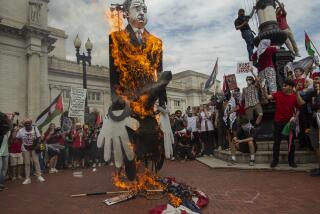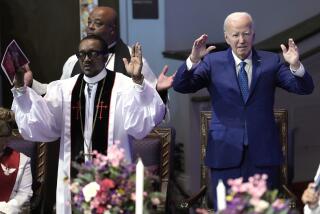Blacks Not in Lock Step as Washington March Nears : Race: Several aspects of âMillion Manâ effort are controversial. Opinions range from support for the demonstrationâs ideals to denunciation of its leaders.
WASHINGTON â If all goes as organizers of the âMillion Man Marchâ plan, 20,000 buses bearing black men from across the nation will line up on the Washington Beltway during the morning rush hour on Monday, Oct. 16.
As throngs of government employees try to commute to work, the buses will parade along the congested bridges and highways toward downtown Washington to discharge their passengers along the two-mile-long mall between the Capitol and the Lincoln Memorial.
About 11 a.m., the âday of atonementâ will begin and, for the next five hours, a procession of speeches, prayers and songs will exhort African American men to âreclaimâ their lives. About 4 p.m., the buses will return to the cityâs center for the trip home--just in time to catch the crushing afternoon rush hour.
âThis city is going to come to a standstill,â said Capt. Tom Wilkins, the U.S. Park Serviceâs assistant commander for special forces.
That seems to be one of the effects the march organizers--former NAACP Executive Director Benjamin F. Chavis Jr. and Nation of Islam leader Louis Farrakhan--most want to have: showing that unified black men wield tremendous power to make the nation go or bring it to a halt.
It is also one of several aspects of the march that makes it so controversial. The swirling current of mixed opinions--from support for the marchâs ideals to denunciations of the marchâs leadership and organization--mirrors the mixed attitudes of black Americans as they grapple with their estrangement from themselves and the nationâs political Establishment.
*
âThis march is an attempt by Farrakhan and Chavis to get black men and black women to focus on themselves and to begin a discussion of how to deal with the issues going on in the black community,â said David Ruffin, editor of FOCUS, a publication of the black-oriented Joint Center for Political and Economic Studies.
Ruffin says the march is a âphenomenonâ that is targeted primarily to working-class black men, many of whom are in their late teens and early 20s and represent âelements of the black community that no one else [in political life] is trying to capture.â
For Earl Ofari Hutchinson, a Los Angeles-based publisher and author, the symbolism of a public display of responsible, black masculinity is what he advocates in his writings, which include the self-published book âThe Assassination of the Black Male Image.â
Yet, Hutchinson will not be among those marching in Washington. âThe concept of the march is a good one,â he said. âBut Iâm not so sure I know what the ultimate point of this march really is.â
Hutchinson says it offends him that the march organizers have declared âa day of atonementâ as the motto of the march. âI have a problem with that,â he said. âAtone for what? It seems to me like theyâre falling into the trap of blaming the victim. Could it be that they are in danger of painting African American men with the same broad, stereotypical brush that they say white America uses?â
Last year when he began promoting the march, Farrakhan said that it would be an effort to gather âdisciplined, sober, committed, dedicated black menâ ready to assume responsibility for their families and their communities. The idea caught on as Chavis, recently ousted as the executive director of the National Assn. for the Advancement of Colored People, joined with Farrakhan and expanded the marchâs mission to include social, economic and political themes.
As word-of-mouth support for the march was fanned by a network of black-oriented talk radio programs and newspapers, an increasing number of traditional black leaders and organizations signed on.
Among those pledging support for the march have been political, religious and grass-roots activists spanning the black political spectrum, including the Rev. Jesse Jackson, Washington Mayor Marion Barry, Baltimore Mayor Kurt Schmoke, the Congressional Black Caucus and the Southern Christian Leadership Conference.
*
The coalition has drawn support from unexpected quarters, including Philadelphia Mayor Edward G. Rendell, who is Jewish, and from black womenâs organizations, such as the National Council of Negro Women and the National Political Congress of Black Women. Some Jewish groups have denounced the march because of Farrakhanâs history of delivering anti-Semitic sermons. And some black women have expressed reservations over the exclusion of women as participants, although poet Maya Angelou is writing a special poem to be read during the march.
Conspicuously absent from the supporting groups is the NAACP, which is still involved in legal disputes with Chavis related to his dismissal last year after a sex and money scandal. âThe concept of the march is one that the NAACP understands,â Myrlie Evers-Williams, chairwoman of the civil rights group, said without offering support or opposition to the march.
Neither Chavis nor Farrakhan responded to requests for interviews.
During a recent news conference Chavis said, âPeople tend to come on board once there is clarity of purpose, once they see the broad cross section of constituenciesâ joining in the march.
Among those most critical of this effort are some black religious leaders, who disagree with Farrakhanâs theological and nationalist views.
âThis march is going to be the coronation of Minister Louis Farrakhan as the leader of Black America,â said the Rev. Eugene Rivers, pastor of the Azusa Christian Community in Dorchester, Mass. âThereâs no real substance to whatâs going on here.â
But others disagree.
âI am dismayed by the jealousies and doctrinal differences that have emerged over this issue,â said the Rev. Curtis Jones, pastor of Madison Avenue Presbyterian Church in Baltimore. âWhatever the differences we have among ourselves, they pale in comparison to the challenges of racism, joblessness, hopelessness and alienation we share as black men in America.â
Jones says he has already filled one bus with men from his church and the surrounding inner-city community and expects to fill another for the march. âI know thereâs no real agenda for the march, no platform and no clearly defined plan for the future,â he said. âBut there is a real need for us to come and stand together in each otherâs presence. Hopefully, something will come of it.â
More to Read
Sign up for Essential California
The most important California stories and recommendations in your inbox every morning.
You may occasionally receive promotional content from the Los Angeles Times.










